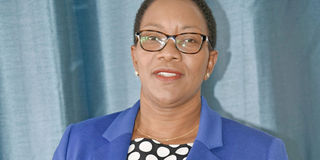Kenya’s women don’t have to die of this cancer

Health CS Sicily Kariuki pictured in her office in Nairobi on November 9, 2018. PHOTO| EVANS HABIL
Cervical cancer is the second most common cancer in women (after breast cancer) and the leading cause of cancer deaths in Kenya.
All women are at risk, and deaths occur 15 to 25 years after infection with human papilloma virus, which is transmitted during sex. In the absence of intervention, there will be at least 6,000 new cervical cancer cases every year, by 2025, up from the current 5,250.
Cabinet Secretary for Health Sicily Kariuki shares more.
How often should women be screened for cervical cancer?
At least once every five years. Those who are HIV-positive should be screened every year, because they are more likely to have persistent HPV infection that those who are HIV-negative. Screening allows for cervical cancer to be detected early when it is still highly treatable.
In Kenya, there are four screening methods: visual inspection with acetic acid (VIA); visual inspection with Lugol’s iodine (VILLI), Pap smear (cytology) and HPV testing. Cervical cancer does not typically cause noticeable symptoms in the early stages, so screening is important to check for abnormal cells, so they can be monitored and treated early.
Tell us more about the planned vaccination drive for girls.
There are more than 100 strains of human papilloma virus, but two types HPV16 and HPV18 account for more than 70 per cent of cervical cancer cases. There are two vaccines: the bivalent vaccine which fights HPV16 and HPV18 and the quadivalent vaccine which fights HPV16 and HPV18, as well as HPV6 and HPV11, which are associated with genital warts. Kenya will be using the quadivalent vaccine. Girls aged 9 to 14 will be vaccinated.
How safe is the vaccine?
It is safe. It is prequalified by the World Health Organisation and sourced by the National Vaccines and Immunisation Programme. Its safety has been independently assured by the Pharmacy and Poisons Board, which is mandated to ensure the quality, safety and efficacy of all medical products. It has been used in other countries across the world to prevent HPV infection.
Will girls who are not in school be vaccinated?
We will use a facility-based approach and supplement that with school and community outreach, based on a county’s needs, to allow us to reach all girls.
What other measures is Kenya using to fight cervical cancer?
Promoting the reduction of high-risk sexual behaviour and discouraging tobacco use/cigarette smoking, which are known risk factors for cervical cancer. We also recommend abstinence or delayed sexual debut for adolescents; faithfulness to one partner for those in relationships; condom use (condoms allow for faster HPV clearance and regression of cervical lesions, and protects against other STIs and HIV which facilitates high-risk HPV infection), and male circumcision.
What happens if I have cervical cancer?
Cervical cancer is treatable if diagnosed early. Treatment is available at level 5 and 6 health facilities (referral hospitals). Treatment options depend on the stage of disease. Often, treatment involves surgical removal of the uterus, in which case the patient may not have children.


